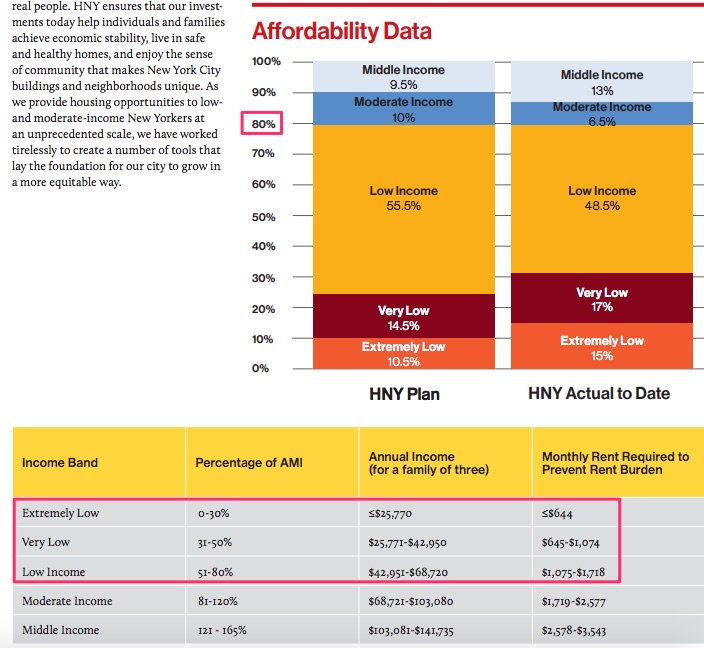Treyger's Council bill would make affordable housing lotteries more transparent; needs finer-grained analysis of moderate- and middle-income bands
Brooklyn Council Member Mark Treyger has a good idea--to make housing lotteries more transparent--but, as I explain below, it needs a few tweaks to better understand the response to higher-income units.
 What's missing
What's missing
Treyger's goal is laudable, but needs a tweak. The definition of "moderate income" is way too broad.
In fact, the city, as shown in the Housing New York Plan, it collapses segments that span two categories for households:
So the categories should be more finely drawn.
Coverage
Here's 12/1/17 coverage in The Real Deal, New Council bill hopes to bring transparency to the housing lottery, quoting Treyger, “We’ll finally know exactly who qualifies for affordable housing and, perhaps more importantly, who doesn’t and why."
Here's 11/30/17 coverage (paywalled) PoliticoPro, New Yorkers could soon get closer look at city's byzantine housing lottery system:
The article mentions the by now well-known phenomenon of dozens of upper middle-income units at 535 Carlton, part of Atlantic Yards/Pacific Park:
Treyger's bill would require the Department of Housing Preservation and Development to report, regarding each housing lottery, the number of applications received and selected, plus the number selected and subsequently rejected and also the number placed on a waiting list, all disaggregated by household income:When affordable housing lotteries are conducted, residents often ask “affordable for who?”— Mark Treyger (@MarkTreyger718) December 1, 2017
My new proposed bill aims to help answer that important question #transparency #accountability #affordableforwho https://t.co/eAYqbZdQFU
- Extremely low income (up to 30% of AMI)
- Very low income (31% to 50% of AMI)
- Low income (51% to 80% of AMI)
- Moderate income (81% to 165% of AMI)
 What's missing
What's missingTreyger's goal is laudable, but needs a tweak. The definition of "moderate income" is way too broad.
In fact, the city, as shown in the Housing New York Plan, it collapses segments that span two categories for households:
- Moderate income (81-120%)
- Middle income (121-165%)
So the categories should be more finely drawn.
Coverage
Here's 12/1/17 coverage in The Real Deal, New Council bill hopes to bring transparency to the housing lottery, quoting Treyger, “We’ll finally know exactly who qualifies for affordable housing and, perhaps more importantly, who doesn’t and why."
Here's 11/30/17 coverage (paywalled) PoliticoPro, New Yorkers could soon get closer look at city's byzantine housing lottery system:
"There has to be some accountability," Council Member Mark Treyger, the bill's sponsor, said in an interview. "This, to me, is a common sense reporting bill to make sure that our housing policies are working."The 535 Carlton example
..."We keep hearing about local community board preference, we keep hearing about 30, 40 percent [area median incomes] that are capturing folks who really need housing the most in the City of New York," Treyger said. "We need to know whether these policies are working."
The article mentions the by now well-known phenomenon of dozens of upper middle-income units at 535 Carlton, part of Atlantic Yards/Pacific Park:
Of the nearly 100,000 applicants for 535 Carlton, part of the Pacific Park development — formerly known as Atlantic Yards — most people sought the lower-AMI units, though it isn't clear exactly how many.Hold on. I reported on that for City Limits, after laboriously analyzing a spreadsheet of applicants (their names redacted) that I received via a Freedom of Information Law request.
"I think the bill would definitely capture these types of examples," Treyger said. "Oftentimes, housing advocates and residents in communities ask the question, 'Affordable for who?' And that's a question that we must answer. And that's really what this legislation is about."
Comments
Post a Comment